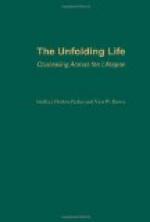(3) The program must be planned with reference to training in habit formation.
Though the latter part of Childhood is the habit forming period of life, pre-eminently, yet habits of Christian activity must be begun during these earlier years. The children in this department are not too young to lay the foundations of regular and punctual attendance, bringing of Bibles, giving to church expenses and benevolences, interest in and gifts for missionary work, daily prayer and, under proper conditions, church attendance.
II. Instruction.
While special teaching must be given in connection with each habit to be formed, the supplemental work and the lesson constitute the principal subjects of instruction.
1. Supplemental Work.
Scripture for memorization in this period should be chosen primarily to help the children in habit formation. Information about the Bible and storing for future use belong in the next period of “Golden memory.” Verses that give the thought of God’s love, and incite loving obedience to Him and to their parents, and loving service to others, are fundamental and should predominate. The Twenty-third Psalm and Lord’s Prayer will have real meaning, and therefore help for the child at this time, if carefully taught. A few of the great stories of the Bible, including those of Christmas and Easter, may be added, and some of the hymns of the church expressing God’s majesty and the thought of service.
2. The Lesson.
Every principle of nurture already discussed bears upon the presentation of the lesson.
(1) The lesson must bring an ideal to the child in concrete form. This will be the truth connected in some way with a person. Where the lesson gives the negative side, or the absence of the truth in life, the positive side must also be presented and made more attractive, since the child’s impulse to imitate, even when warned against it, is stronger than the warnings. He must always be sent away with something to do, rather than not to do.
(2) This ideal must always be given in a story. When the lesson material is abstract, like the Epistles or Psalms, a truth to be taught should be selected from it, and then made concrete and living in some Bible story.
(3) The story itself is the mainspring to action, not the application.
The forceful, vivid and realistic presentation of the story, made possible as the teacher lives in it, impels the child to imitation; the application, or “ought,” appeals to his reason and compels him, and action is always more hearty when impelled than when compelled. The only after touch upon the story which is helpful to little children lies in plans for imitating the activity which has been pictured. Even this is not always to be done. Jesus left the most wonderful story He ever told with no words of application, for they were unnecessary. He knew that every prodigal would feel a tug at the




